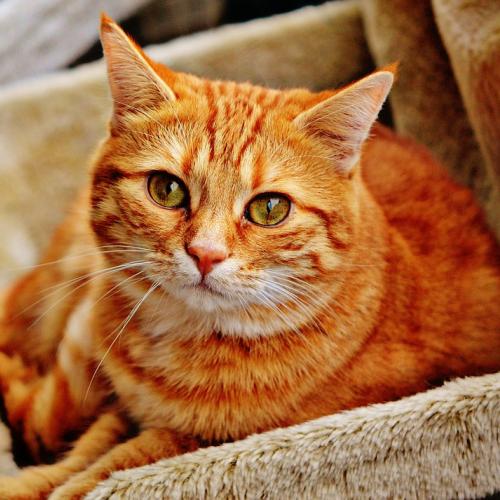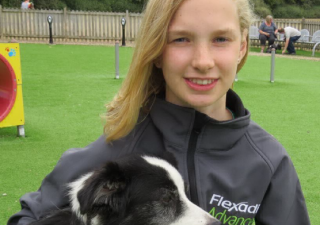
How to prepare your cat for the firework season
Back to overviewUnfortunately, fireworks are no longer confined to just one or two nights of the year, they can be a part of any celebratory occasion. But from Halloween to New Year is the time of year that fireworks are most popular in the UK and is therefore often referred to as the ‘firework season’.
It is always a good idea to prepare your cat for the firework season. Even if your cat did not seem to have a problem last year, this year the sounds may be different or louder or your cat’s fear may have increased. It is not unusual for cats to become more nervous and reactive to sounds as they get older.
Allowing your cat to become accustomed to the sounds of fireworks
It is not just the loudness of fireworks that can scare a cat. Sounds that are unfamiliar can also be frightening. Introducing these sounds at a low level, allowing the cat to become gradually accustomed to them, can therefore help to reduce or prevent fear of the real thing.
1. It is best to start a few weeks before the beginning of the firework season.
2. Firework sounds are available on CD or to download
3. Because cats have far more sensitive hearing that us, it is advisable to initially play the sounds at the very lowest volume, even if you can’t hear anything.
4. You can tell if the volume is too high if at any stage your cat shows any following signs of fear;
o Ears flattened to the side
o Lowered body posture
o Tongue flick (a quick lick of the nose)
o Any attempt to get away or hide.
If you see any of these signs, turn the sound off immediately then try again later at a lower volume. Playing at too high a volume is more likely to cause, rather than prevent fear.
5. While playing the sounds try to engage your cat in a favourite game and/or feed a few small tasty treats. This can help your cat to make good associations with the sounds.
6. Try to play the sounds for a few minutes, 2-3 times a day.
7. As long as your cat is happy and relaxed and not showing any signs of fear, increase the volume by a tiny bit each day. But be very careful not to increase the volume too much or too quickly.
Train your cat to come indoors when you call
If frightened by fireworks when outside a cat may panic and try to run away, which can greatly increase the chance that he could get lost or be hit by traffic. So it is essential that he is safely confined indoors. Teaching your cat to come indoors when you call him can help you to ensure that he is safe before the fireworks start.
1. Experiment to find what food treats, and/or games your cat enjoys most.
2. Make a specific sound and then immediately give him a food treat and/or play a game.
o You can simply call his name, but sounds such as a whistle or a bell (not too loud) can sometime be ‘more salient’. In other words, they are sounds he may be able to notice and hear better, especially if he is some distance away. Often the best thing is to use both your voice and a bell or whistle.
3. Repeat often, before long he should be looking to you and running to you for a treat or game as soon as he hears the specific sound.
4. Practice calling him from room to room and then try calling him indoors from the garden.
5. It can also help to give him an extra special treat when he comes indoors at dusk.
Accustom your cat to being shut indoors
If your cat is normally allowed to come and go when he pleases he may not like being shut in and may even panic when the scary noises start because he might feel that he can’t escape. So it is important to teach him to accept being shut in and that home is a safe place to be, especially after dark.
1. Start by providing an indoor litter tray a few days before you start to shut him in so that he can learn where it is.
o You may need to provide more than one litter tray as some cats prefer one area to urinate and a separate area to defecate. If you have more than one cat it is advised to provide one litter tray per cat plus one extra.
2. Starting a few days before the fireworks start, call your cat in at dusk or as soon as you can after dark.
3. Lock the cat flap as soon as he comes in and then engage him in a favourite game and/or feed him a meal containing an extra tasty treat.
4. Try to make his time shut in a good time for him. Allow him access to his favourite resting places and do the things that he enjoys, games, fuss etc. and avoid doing anything he doesn’t like, especially anything that may frighten him. For example, this would not be a good time to vacuum the house.
Provide a safe place for your cat to hide
A cat’s natural reaction when frightened is to run away or to find somewhere to hide. Even if you have accustomed your cat to firework sounds when they get very loud he may still need somewhere safe to hide.
Your cat may already have a place that he retreats to when feeling frightened. If so you must make sure that he can easily get to this place when the fireworks start. But it is also a good idea to provide other hiding places around the house so that he never has too far to go. Cardboard boxes, igloo beds, even under a chair with a towel draped over it can be good places for a cat to hide.
Speak to your vet
Especially if you already know that your cat is frightened of fireworks, it can be a good idea to speak to your vet well in advance about any products he or she can recommend that may help your cat to feel less fearful at this time.
Trudi Atkinson RVN, Dip.AS (CABC), CCAB
Trudi Atkinson is a full member of the Association of Pet Behaviour Counsellors (APBC) and a Certificated Clinical Animal Behaviourist (CCAB). She runs a behaviour referral practice covering South West UK dealing exclusively with feline behaviour problems. She initially qualified as a veterinary nurse in 1986 and spent several years in veterinary practice before undertaking further study and gaining a post graduate diploma in companion animal behaviour counselling from Southampton University in 1999. As well as helping cat owners and their pets with behaviour problems, Trudi has also contributed to behaviour and veterinary textbooks and has presented several talks on the behaviour of pet animals, especially cats.

Tips & Tricks
- Easter is a wonderful time of year with so many chocolate Easter eggs in abundance, but make sure you do not let your pet near them.
- With Brexit deal still in negotiation and a possibility of a ‘no deal’ scenario, there are no concrete answers just yet – but to help you become more informed, here is our Q&A on what we can find so far.
- Build-up of wax and debris in your pet's ear canals can lead to discomfort and irritation. Cleaning your pet’s ears can have a lot of benefits and here are some tips to get you started!
- We had a great time catching up with Mariann Bayliss, our sponsored agility handler last week. We met her competing dog, Ila, and her 5 month old puppy Coral.





